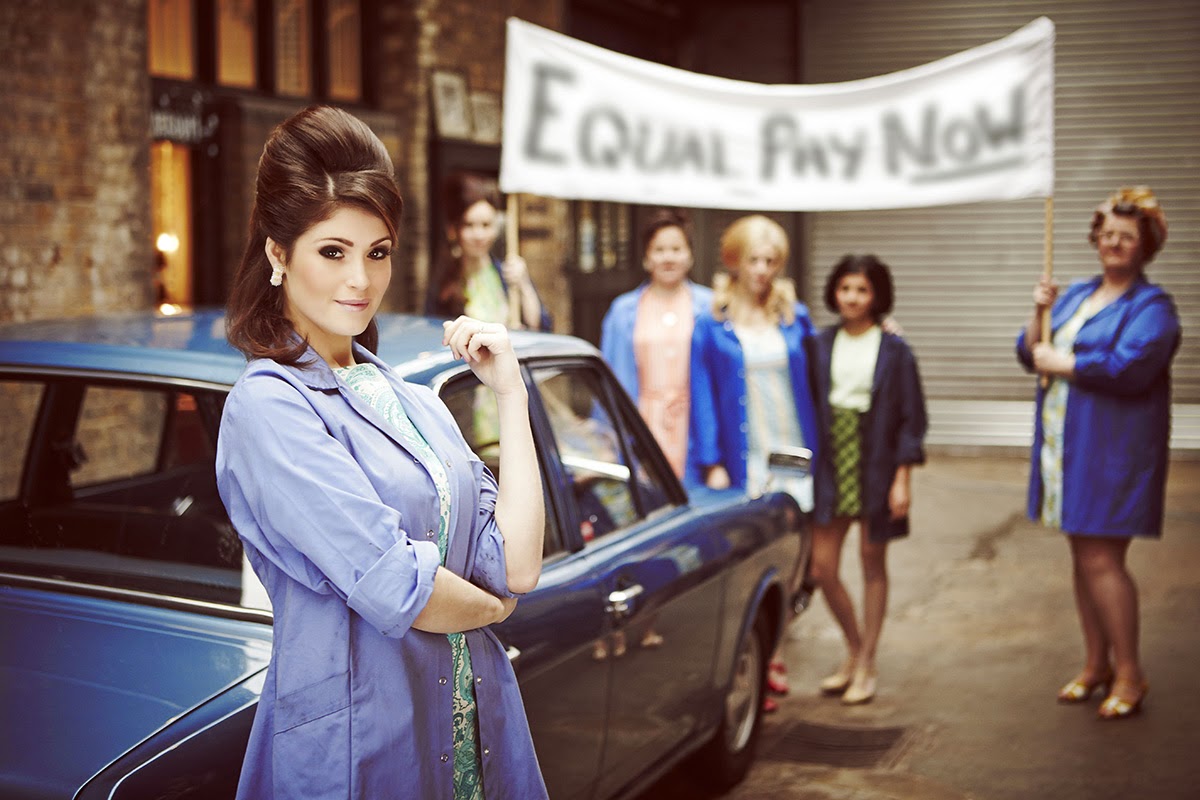Adelphi Theatre, London
Now showing
★
Now showing
★
Made in Dagenham follows the true story of a group of women who strike for equal pay. These ordinary factory workers in 1968 took on Ford Motors and won – not just for them, but for every woman. The story was adapted for the 2010 film and now hits the West End in a brand new musical.
I was there last night and as I haven’t seen the film, I knew pretty much nothing of the story. As the curtain opens, Gemma Arterton playing Rita starts singing the title song ‘Made in Dagenham’. This is a real show-stopping tune that made me smile and feel a rush of excitement for what was to come. As the incredible set rotates, lifts and seamlessly shifts into place, we are introduced to the female factory workers; a group of ordinary, working women with comically foul-mouths and a cheeky disposition. Another song introduces their characters and working conditions to the audience. The set moves again and we are with the men of the factory as they build the cars. I did feel that this third song in succession was unnecessary. I would have liked a small respite here.
As the journey continues, we are introduced to the Prime Minister of the time, Harold Wilson. For some reason, his character was made into the comic relief with the PM pirouetting, smoking a pipe suggestively and curled up sucking his thumb like a baby. The audience reaction was a 50/50 split with some laughing so uncontrollably that they were bent over in their seats and others – myself included – who didn’t even break a smile. I felt it was too contrived and was humour best suited in the 80s for the likes of Les Dennis than on a stage today.
There were shinning performances from many of the cast though. Gemma Arterton really held her own through the entire show with a pitch-perfect voice and flawless acting. Her husband Eddie played by Adrian Der Gregorian gave one of the best solo performances of the entire show with ‘The Letter’. Unfortunately in this song was a reference to queer which just wasn’t needed; and the writers didn’t stop there. The villain of the story is the Ford representative, Tooley played by Steve Furst. The opening number of Act 2 brings Tooley to the factory announcing that the factory is actually part of America. As part of the song, he screams that America is straight and we are gay. This hit me in two waves; first, disbelief and then anger that it had just happened. After the way over-the-top performance which also included an army vehicle with scantily clad girls bearing fire arms, Tooley then used the word faggot countless times. That word instantly goes through me as one of the worst insults to call a gay man, and here it is being fired at several cast members, one who was intentionally camp and playing up to it for the audience like he was John Inman circa 1975. At this point I wanted to storm out of the theatre I was so upset. Many of the audience members were laughing at this while a smaller proportion were definitely not amused. I understand the writer, Richard Bean’s intention to make Tooley into the big bad, but there are many ways of doing this without upsetting members of your audience. If this were a musical about the fight for homosexual rights, it would be understandable, but it isn’t. It would be the same as shouting out ni**er to the only black member of the cast, Naana Agyei-Ampadu. I don’t think there would be any laughs in the audience then – so why should the word faggot get such a response and anyone feel that such a word should be used completely out of context – and be funny?
After that, I lost any love I had for the show. There was a terrific all-cast number shorty after and many heart-filled moments, but I was still reeling at the America number. Towards the end, we see Tooley again. He enters through a door and tip-toes to Rita’s written speech she is about to read to the TUC and tears it up. There were actual boos in the audience as if he were a pantomime villain – but this isn’t a pantomime; this is supposed to be an adult musical for the West End.
There were moments of brilliance in Made in Dagenham. The set is beautifully created, David Arnold has written an excellent score with music that blends seamlessly together and some of the performances are outstanding. There are of course bits that need tweaking; a few forgotten lines, over running songs, actors not being able to hit the high notes and a few staging problems – but all these are minor and can easily be ironed out. The main worry is the barrage of homophobic references throughout the show. Tooley delivers the most disgusting and painful outbursts, but even in the beautifully performed song ‘The Letter’ there is the unnecessary use of the word queer. There are even conversations between the male factory workers where they belittle the trans-gender community. There is just no need for any of this and the fact that half the audience were laughing shows that it is still “acceptable” to make fun of LGBT people. It isn’t. For a show that follows the real-life struggles of women gaining equality, I am disgusted that Richard Bean doesn’t even see that equality for all actually includes us too.
If the show is not rewritten to amend these changes, I can foresee a huge back-lash from the gay community and I for one will proudly be on the ‘picket line’.
#TerryGee
Note: The seats are very low at the Adelphi and quickly become uncomfortable. Booster seats are available from the cloak room.

